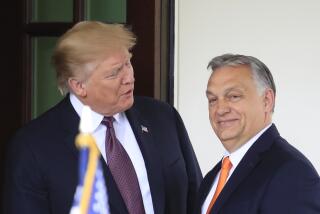Hungary’s Probable Premier Thinks Big, With Russia in Mind
- Share via
BUDAPEST, Hungary — The former Communist and banker poised to be Hungary’s next prime minister began talks with political allies Monday on the details of a new center-left coalition government and called for better ties with Russia.
Peter Medgyessy, whom the Hungarian Socialist Party picked as its candidate even though he has never joined the party, also declared that he can fulfill expensive campaign promises.
The Socialists joined forces with the Alliance of Free Democrats in elections Sunday that gave them control of parliament and the power to form the next government. But they still must agree on how to share Cabinet positions.
The Socialists won 178 seats in the 386-seat parliament, while the Free Democrats took 20. Parties of the current governing coalition--FiDeSz-Hungarian Civic Party and the Hungarian Democratic Forum--ran with a joint list of candidates and took 188 seats.
Joining the European Union in 2004 will be a top priority for the incoming government, as it was for the outgoing center-right government of Prime Minister Viktor Orban. But Medgyessy and Socialist Party President Laszlo Kovacs said at a news conference Monday that they want to improve relations with Russia too. Both were Communist Party members when Hungary was under Soviet domination.
‘A Question of Style,’ Socialist Leader Says
“This is not really a question of content--it is more a question of style,” Kovacs said, taking a political swipe at what critics saw as a nationalist tone to Orban’s dealings with other countries in the region. “If Hungary does not try to act like a power with respect to Russia, then that’s already half of success.”
Relations with Moscow are important because of Russia’s “international and regional role” and “the Russian market,” Kovacs said.
In recent years, the Hungarian economy, which once was tightly integrated into Soviet-bloc trade, has turned heavily toward the West. The trend of abandoning the Russian market has gone too far, Medgyessy said.
Medgyessy said he was sure that Russian President Vladimir V. Putin is committed to reform. “I’m also convinced that in Russia, reform and change have become irreversible in recent years,” he said. “In terms of economic relations, there are big opportunities.”
Rather than backing away from campaign promises of increased social spending combined with tax cuts--a program many analysts said was unrealistic--Medgyessy went out of his way Monday to stress that the pledges would be fulfilled.
“Let me highlight just a few important steps,” he said. “In August, we will pay a double amount of family subsidy before school starts, which will be repeated every August. . . . From Oct. 1 and Sept. 1, respectively, the pay of teachers and health-care workers will be raised. Also, university scholarships will be increased by 30% from Sept. 1. These are just examples.”
Medgyessy insisted that the government can afford the proposed social programs. “Hungarian economic growth, if led professionally, can generate the necessary resources,” he said, predicting average growth of 4.5% over the next four years. Analysts view that target as optimistic but not unrealistic.
New Parliament Must Gather Within 30 Days
Gabor Kuncze, leader of the Free Democrats, said at another news conference Monday that coalition talks would require several weeks and that “a government could be formed within six weeks from today.”
Hungarian President Ferenc Madl must convene the new parliament within 30 days after the election. He also must nominate a prime minister, seen as virtually certain to be Medgyessy. The prime minister-designate needs majority support in parliament to set up a government.
Center-left leaders said there was no way that FiDeSz could gather enough parliamentary support to stay in power.
In a letter from the leaders of the center-left alliance to Madl, Kovacs said, “We declared that neither the Hungarian Socialist Party nor the Free Democrats would have coalition talks with FiDeSz or the Hungarian Democratic Forum, so there is no chance for another party to set up the government.”
More to Read
Sign up for Essential California
The most important California stories and recommendations in your inbox every morning.
You may occasionally receive promotional content from the Los Angeles Times.













